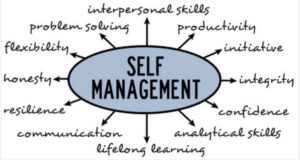- Home
- LP Courses
- Social Emotional Learning (SEL)
- “Less Talk More SEL” Toolkit
2.2 How can I identify it?
Here are the 6 skills to identify and learn:
Impulse Control- Displaying proactive behaviors that regulate emotions to consider consequences or outcomes.

Example: When you start to feel yourself getting upset or uncomfortable in any situation, you can excuse yourself before the situation goes left, or calmy express that you would like to revisit the issue at a later time.
The energy that fuels impulsive behavior, such as angry outbursts, is the same energy that can be harnessed to motivate you to reach further and higher than ever before. When something stresses you out or drives you to anger, use that event as motivation.
Stress Management- Implementing effective stress techniques will allow you to be proactive in managing the things that pop up in life, rather than reacting in negative ways.
The key to managing stress effectively is delaying your initial reaction and thinking about an effective way to deal with a situation. Take the time to breathe, think and relax. Only then are you in a good state of mind to make the right choices about how to move forward.

Self-Discipline- the ability to control one’s feelings and overcome one’s weaknesses; the ability to pursue what one thinks is right despite temptations to abandon it.
We aren’t born with self-discipline — it’s a learned behavior. And just like any other skill you want to master, it requires daily practice and repetition.
Example: If you want to eat healthier, don’t buy junk food. If you want to improve your productivity at work, turn off notifications and silence your cell phone. The fewer distractions you have, the more focused you will be on accomplishing your goals. Set yourself up for success by ditching bad influences.
Self-Motivation- Is the ability to do what needs to be done, without influence from other people or situations.
Practicing Intrinsic motivation will create a consistent system of self-motivation for you. Nothing is stronger than intrinsic motivation, and when we connect with it, we exert considerable effort without any expectation of reward. The performance itself becomes its own reward.

Goal- Setting – is the process of identifying something that you want to accomplish and establishing measurable goals and timeframes.
A clear plan outlines each step you must take in order to reach your goals. Figure out who you are and what you are about. Create a mantra to keep yourself focused. Successful people use this technique to stay on track and establish a clear finish line.
Organizational Skills – Organizational skills refer to your ability to stay focused on different tasks, and use your time, energy, strength, mental capacity, physical space, etc. effectively and efficiently in order to achieve the desired outcome.
Below find some key time management skills that will help you stay organized:
- Creating and keeping deadlines.
- Delegation.
- Decision making.
- Project management.
- Making schedules.
